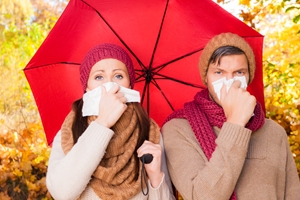
Summer is the perfect time to be outside, enjoy family and friends and get some fresh air. But for allergy sufferers, summer allergies can put a damper on the sunshine season. Now that we are well into the month of August, it is important to prepare for what comes next in terms of allergies and asthma: ragweed.
Ragweed, historically, presents itself and starts affecting individuals in mid-to-late August. However a recent report shows that it is already present in most communities almost a full week earlier than expected. The Gottlieb Allergy count included ragweed pollen in their tally, which is expected to name the pesky allergen until late October. Ragweed affects 10 to 20 percent of Americans according to the Chicago Sun-Times.
Ragweed allergies are usually indicated by stuffy and runny nose, sneezing, asthma attacks, itchy skin, eyes, nose and throat, as well as trouble sleeping. For the people who are prone to ragweed allergies, there are a few things you can do to reduce the impact of symptoms and make the end of summer a bit more enjoyable:
- Allergy prevention – According to the American Academy of Allergy, Asthma and Immunology (AAAAI), allergy shots can help reduce or prevent symptoms and is effective in approximately 90 percent of patients. It is also a good idea to schedule an appointment with your doctor before your allergies kick into high gear. Your physician will be able to help you develop a plan of action for preventing and combating allergens and their inconvenient symptoms.
- Check counts – The best form of prevention is preparation. Know what you are dealing with by checking pollen counts in your area online or on mobile apps like the ones from Zyrtec and AllergyManager.
- Close windows – You want your home to be a safe haven. Try to keep windows and doors closed so that you aren't letting in any unnecessary pollen. The same is true while you are in the car. You are better off getting cool air from air conditioning systems that will filter the air first.
- Showers – Best practice for allergy sufferers is to shower before bed in order to wash off the allergens that may have clung to you throughout the day. You don't want to bring pollen into bed with you, so be sure to wash your face and hair. It also may be a good idea to invest in hypoallergenic sheets and allergenic mattress covers.
- Stay ahead of allergens – Take medications before you start to feel symptoms of pesky allergies. If you have a prescription for your allergies, make sure you have it filled and on hand. It is a good idea to have a nasal spray, oral antihistamine and eye drops in the medicine cabinet or your bag for easy access.
It is important to remember that where you live plays a large role in the effect that ragweed will have on your life. According to How Stuff Works, living west of the Rocky Mountains is the best idea for severe ragweed sufferers, as the pollen count is much lower in that region.
Like most allergies, ragweed can make other allergies and asthma attacks much worse, so it is best to keep as much control over your allergy as possible.
For more tips and tricks for allergy prevention, or information on products and tools that you can use to reduce your symptoms, visit Allergy Be Gone today!









